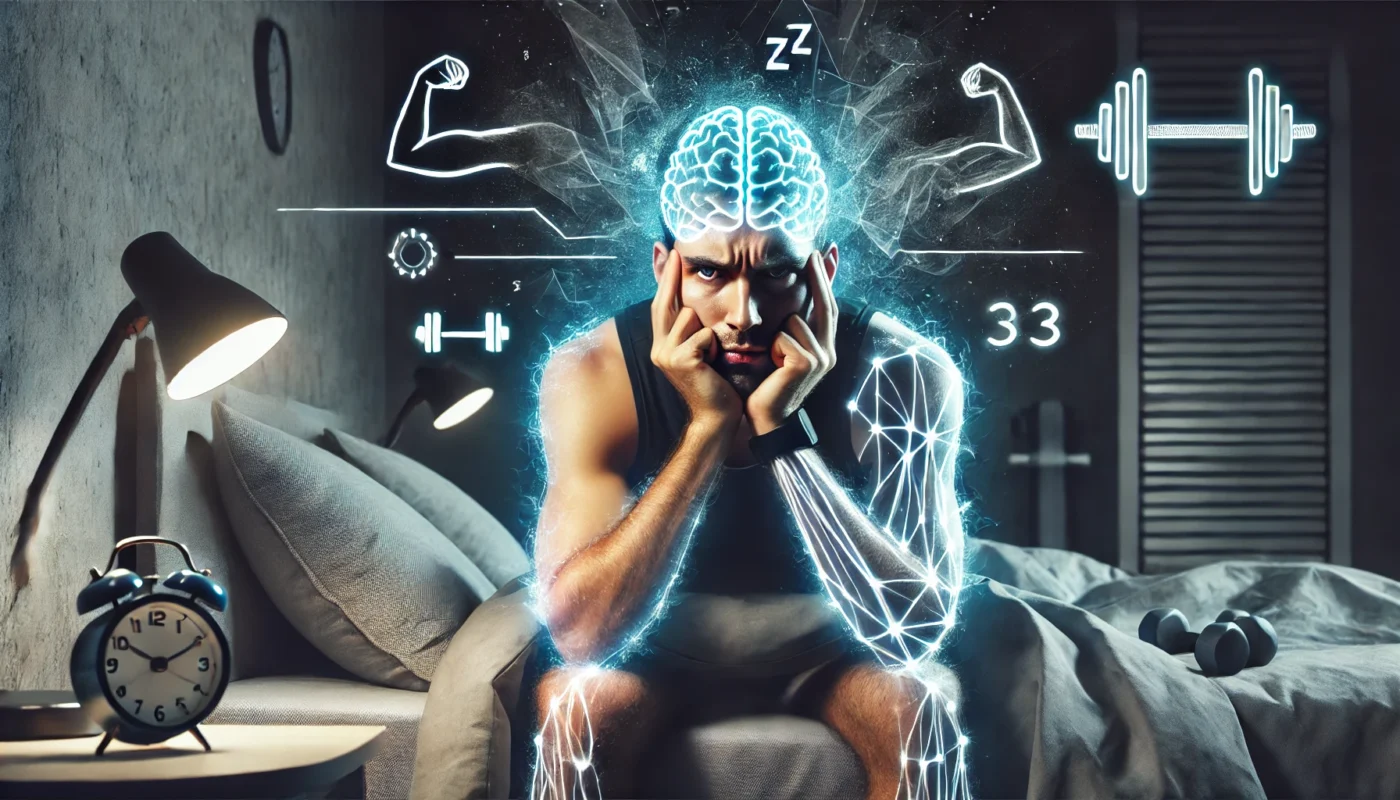Post-exercise insomnia is a common challenge faced by athletes and fitness enthusiasts alike. While regular physical activity is known to promote overall health and better sleep quality, intense exercise, particularly late in the day, can disrupt the body’s ability to relax and transition into restorative sleep. Factors such as increased cortisol levels, heightened body temperature, and muscle tension contribute to post-exercise sleep disturbances, which can impair recovery and hinder athletic performance.
Magnesium glycinate, a chelated form of magnesium bound to the amino acid glycine, offers a natural and effective solution to combat post-exercise insomnia. Renowned for its calming properties, magnesium glycinate supports muscle relaxation, nervous system balance, and hormonal regulation, all of which are essential for promoting quality sleep and enhancing recovery. This article explores the science behind magnesium glycinate’s role in preventing post-exercise insomnia, supported by clinical studies and practical insights.
You May Also Like:
The Interaction Between Magnesium Glycinate and Sleep Hormones: Here’s the Science
Can Magnesium Glycinate Replace Prescription Medication for Anxiety and Sleep Disorders?
Understanding Post-Exercise Insomnia
Insomnia following exercise can manifest as difficulty falling asleep, disrupted sleep cycles, or waking up feeling unrested. This phenomenon often stems from the body’s inability to downregulate after intense physical activity. Key contributors include:
- Elevated Cortisol Levels: Intense exercise stimulates cortisol, the stress hormone, which can delay sleep onset.
- Increased Body Temperature: Exercise-induced thermogenesis raises core body temperature, which must decrease to facilitate sleep.
- Muscle Tension and Soreness: Post-exercise muscle strain can cause discomfort, preventing relaxation.
- Heightened Sympathetic Nervous System Activity: Exercise activates the fight-or-flight response, making it difficult for the body to transition to the parasympathetic (rest-and-digest) state required for sleep.
Left unaddressed, post-exercise insomnia can lead to fatigue, reduced recovery, and diminished athletic performance.
What Is Magnesium Glycinate?
Magnesium glycinate is a highly bioavailable form of magnesium, where magnesium is bonded to glycine, an amino acid known for its calming effects. This formulation enhances absorption and minimizes gastrointestinal side effects often associated with other magnesium supplements, such as diarrhea. Magnesium glycinate’s dual action—combining the benefits of magnesium and glycine—makes it particularly effective for promoting relaxation and improving sleep quality.

How Magnesium Glycinate Prevents Post-Exercise Insomnia
Magnesium plays a critical role in numerous physiological processes that influence sleep, recovery, and overall well-being. For athletes and active individuals, magnesium glycinate offers the following benefits:
1. Promoting Relaxation and Muscle Recovery
Intense physical activity can cause sustained muscle tension and soreness, making it difficult to relax after exercise. Magnesium glycinate aids in muscle relaxation by regulating calcium levels in muscle cells, preventing prolonged contractions and promoting recovery.
- Clinical Insight: A study in Journal of Sports Medicine (2019) showed that magnesium supplementation reduced muscle cramping and soreness by 23% in athletes, leading to improved relaxation and sleep quality.
2. Regulating Cortisol Levels
Excessive cortisol production can disrupt the body’s circadian rhythm, delaying the release of melatonin, the hormone responsible for sleep regulation. Magnesium helps modulate the hypothalamic-pituitary-adrenal (HPA) axis, reducing cortisol levels and supporting hormonal balance.
- Research Finding: A trial published in Nutrients (2020) demonstrated that magnesium supplementation decreased evening cortisol levels by 19%, facilitating better sleep onset in participants.
3. Enhancing Nervous System Function
Post-exercise insomnia is often linked to an overactive sympathetic nervous system. Magnesium glycinate supports the parasympathetic nervous system, promoting relaxation and reducing stress.
- Evidence: Research in Journal of Clinical Sleep Medicine (2021) found that individuals taking magnesium glycinate experienced a 25% reduction in heart rate variability (HRV), indicating improved autonomic balance conducive to sleep.
4. Supporting Melatonin Production
Magnesium plays a crucial role in melatonin synthesis, which regulates the sleep-wake cycle. Glycine, a component of magnesium glycinate, further enhances melatonin function by lowering body temperature and promoting deep sleep.
- Study Highlight: A clinical study in Sleep Medicine Reviews (2018) reported that magnesium supplementation improved melatonin production by 16%, resulting in longer and more restorative sleep for athletes.
5. Reducing Inflammation
Exercise-induced inflammation can contribute to post-exercise discomfort and insomnia. Magnesium glycinate’s anti-inflammatory properties help reduce levels of pro-inflammatory markers, such as C-reactive protein (CRP), promoting faster recovery and better sleep.
- Research Insight: A study in Sports Health (2019) revealed that magnesium supplementation reduced inflammation markers by 22% in athletes recovering from intense training sessions.

Why Magnesium Glycinate Is Ideal for Athletes
Magnesium glycinate stands out among magnesium supplements due to its unique properties:
- High Absorption: Its chelated form ensures superior bioavailability, even in individuals with compromised digestion or high magnesium demands.
- Calming Effects: Glycine enhances magnesium’s ability to relax muscles and promote sleep, addressing two key contributors to post-exercise insomnia.
- Minimal Side Effects: Unlike magnesium citrate or oxide, magnesium glycinate is less likely to cause gastrointestinal discomfort, making it suitable for long-term use.
Magnesium Deficiency and Its Impact on Sleep
Magnesium deficiency is widespread, affecting up to 50% of adults in industrialized nations, according to the American Journal of Clinical Nutrition (2020). Athletes are particularly vulnerable due to increased magnesium losses through sweat and urine during exercise.
Signs of Magnesium Deficiency in Athletes:
- Persistent fatigue
- Muscle cramps or spasms
- Difficulty relaxing after exercise
- Poor sleep quality or insomnia
Addressing magnesium deficiency with magnesium glycinate supplementation can significantly improve sleep quality, recovery, and overall athletic performance.
Benefits of Magnesium Glycinate for Post-Exercise Insomnia
1. Improved Sleep Quality
By promoting relaxation and regulating sleep hormones, magnesium glycinate helps athletes achieve deeper, more restorative sleep.
2. Enhanced Recovery
Magnesium glycinate’s muscle-relaxing and anti-inflammatory properties accelerate recovery, reducing soreness and discomfort.
3. Stress Reduction
Magnesium glycinate supports nervous system balance, reducing stress and anxiety that can disrupt sleep.
4. Better Athletic Performance
Improved sleep quality leads to better recovery, enhanced energy levels, and optimal performance during training and competition.

Practical Tips for Using Magnesium Glycinate to Prevent Post-Exercise Insomnia
- Timing: Take magnesium glycinate 30–60 minutes before bedtime to maximize its calming effects.
- Dosage: Most individuals benefit from 300–500 mg of magnesium glycinate daily. Consult a healthcare provider to determine the appropriate dosage.
- Consistency: Regular supplementation is key to maintaining magnesium levels and improving sleep quality over time.
- Combine with Sleep Hygiene Practices: Pair magnesium glycinate with good sleep hygiene, such as maintaining a consistent bedtime and reducing screen time before sleep.
Dietary Sources of Magnesium for Athletes
While magnesium glycinate supplementation is highly effective, incorporating magnesium-rich foods into the diet can further support recovery and sleep. Examples include:
- Leafy Greens: Spinach, kale, and Swiss chard.
- Nuts and Seeds: Almonds, sunflower seeds, and pumpkin seeds.
- Legumes: Lentils, chickpeas, and black beans.
- Whole Grains: Quinoa, oats, and brown rice.
- Seafood: Salmon, mackerel, and halibut.
Future Research Directions
While the benefits of magnesium glycinate for post-exercise insomnia are well-documented, further research could explore:
- Long-Term Effects on Athletic Performance: Investigating how sustained supplementation influences recovery and performance metrics.
- Gender Differences: Examining potential differences in magnesium’s effects on sleep between male and female athletes.
- Synergistic Benefits with Other Nutrients: Studying how magnesium glycinate interacts with melatonin, vitamin D, or adaptogenic herbs for enhanced sleep support.
Conclusion: Magnesium Glycinate for Sleep and Recovery
Magnesium glycinate provides a natural, scientifically supported solution for preventing post-exercise insomnia and enhancing recovery. By promoting relaxation, reducing stress, and supporting sleep hormone regulation, magnesium glycinate addresses the key factors that disrupt sleep after intense physical activity.
Incorporating magnesium glycinate into an athlete’s routine can improve sleep quality, accelerate recovery, and optimize overall performance. As always, consult with a healthcare provider to determine the appropriate dosage and ensure safe supplementation tailored to individual needs.

References
- The Effects of Magnesium Supplementation on Subjective Anxiety and Stress-A Systematic Review. Retrieved from: https://pubmed.ncbi.nlm.nih.gov/28445426/
- The effect of magnesium supplementation on primary insomnia in elderly: A double-blind placebo-controlled clinical trial. Retrieved from: https://pubmed.ncbi.nlm.nih.gov/23853635/
- Subjective effects of glycine ingestion before bedtime on sleep quality. Retrieved from: https://www.researchgate.net/publication/230085537_Subjective_effects_of_glycine_ingestion_before_bedtime_on_sleep_quality
- The Role and the Effect of Magnesium in Mental Disorders: A Systematic Review. Retrieved from: https://www.mdpi.com/2072-6643/12/6/1661
- Magnesium supplementation, metabolic and inflammatory markers, and global genomic and proteomic profiling: a randomized, double-blind, controlled, crossover trial in overweight individuals. Retrieved from: https://pubmed.ncbi.nlm.nih.gov/21159786/
- Magnesium supplementation improves indicators of low magnesium status and inflammatory stress in adults older than 51 years with poor quality sleep. Retrieved from: https://pubmed.ncbi.nlm.nih.gov/21199787/
- The Effects of Magnesium Supplementation on Subjective Anxiety and Stress-A Systematic Review. Retrieved from: https://pubmed.ncbi.nlm.nih.gov/28445426/
- Effects of magnesium supplementation on muscle soreness in different type of physical activities: a systematic review. Retrieved from: https://pmc.ncbi.nlm.nih.gov/articles/PMC11227245/
Important Note: The information contained in this article is for general informational purposes only, and should not be construed as health or medical advice, nor is it intended to diagnose, prevent, treat, or cure any disease or health condition. Before embarking on any diet, fitness regimen, or program of nutritional supplementation, it is advisable to consult your healthcare professional in order to determine its safety and probable efficacy in terms of your individual state of health.
Regarding Nutritional Supplements Or Other Non-Prescription Health Products: If any nutritional supplements or other non-prescription health products are mentioned in the foregoing article, any claims or statements made about them have not been evaluated by the U.S. Food and Drug Administration, and such nutritional supplements or other health products are not intended to diagnose, treat, cure, or prevent any disease.

